Emotional Intelligence: Leading Performance and Well-being
VerifiedAdded on 2020/06/03
|13
|3365
|350
Report
AI Summary
This report delves into the concept of emotional intelligence (EI), examining its definition and critically comparing the prominent theories of Mayer and Salovey, and Goleman. The report highlights the key components of each theory, such as emotional perception, facilitation, understanding, and management (Mayer and Salovey), and self-awareness, self-regulation, social skills, empathy, and motivation (Goleman). The analysis favors Goleman's model for its practical approach to developing EI. Furthermore, the report explores the crucial role EI plays in leading performance and fostering well-being, emphasizing its impact on inspiration, personal achievements, motivation, happiness, professional success, opportunity recognition, leadership skills, communication, continuous improvement, relationships, social skills, and self-management. The report concludes by underscoring the significance of EI in achieving both individual and organizational success, offering a comprehensive overview of its multifaceted benefits.
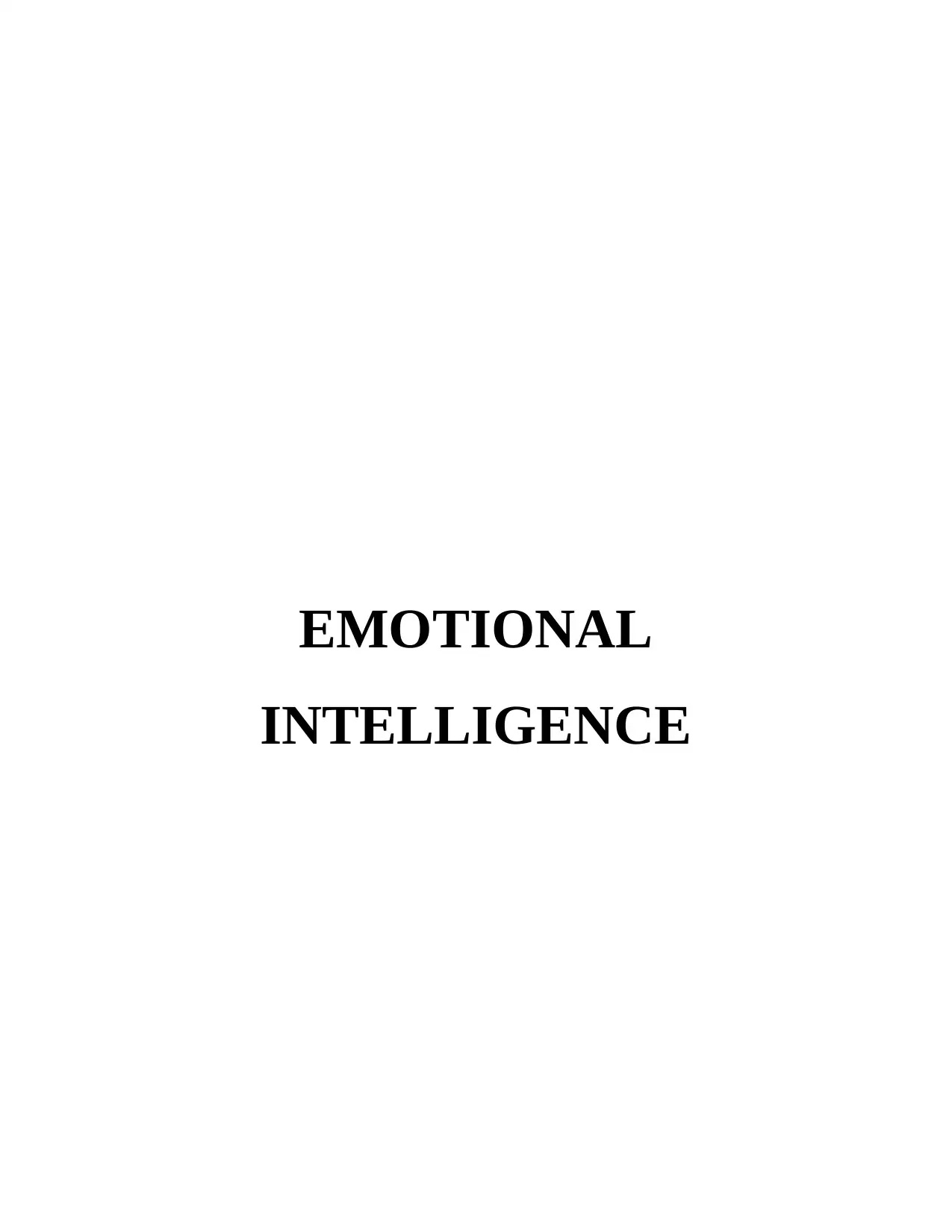
EMOTIONAL
INTELLIGENCE
INTELLIGENCE
Paraphrase This Document
Need a fresh take? Get an instant paraphrase of this document with our AI Paraphraser
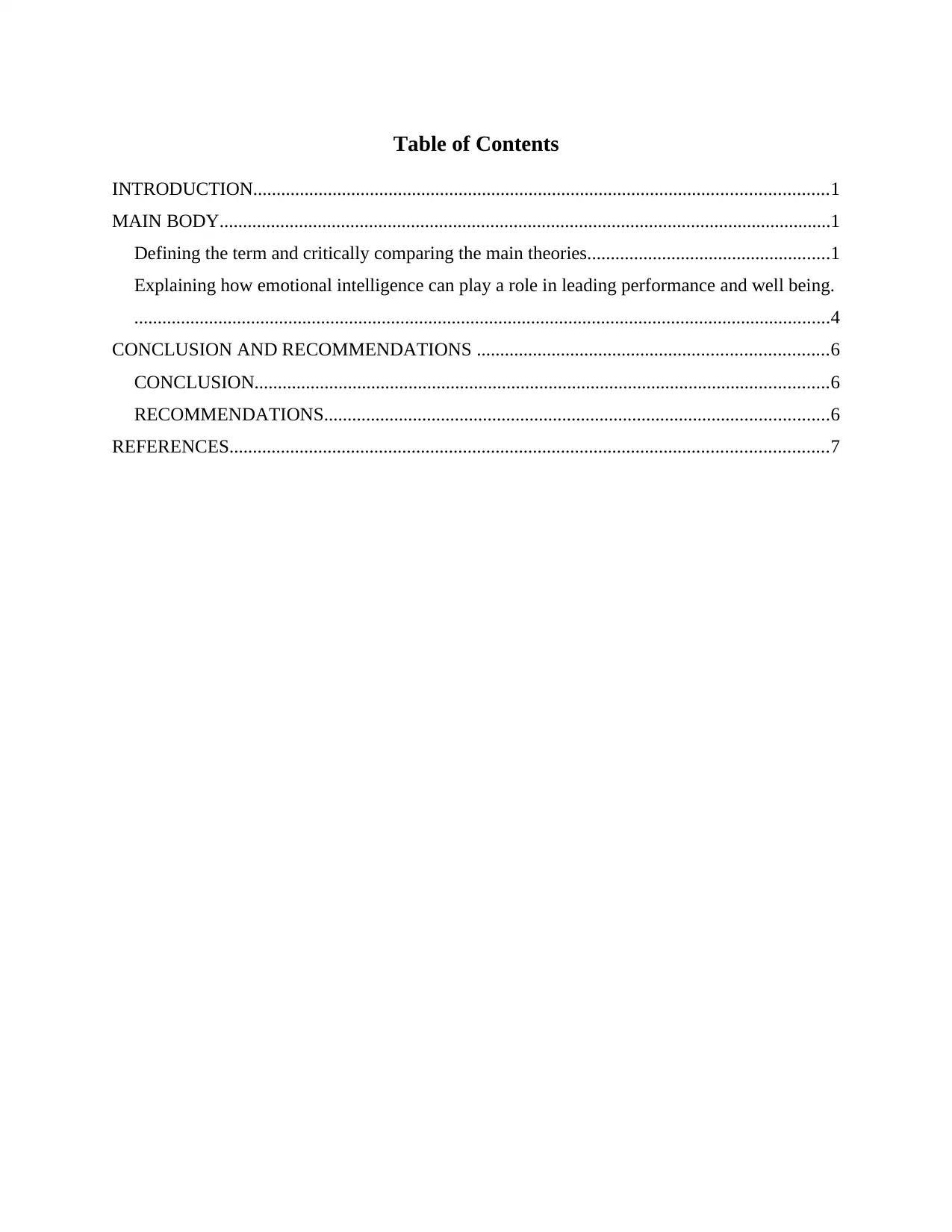
Table of Contents
INTRODUCTION...........................................................................................................................1
MAIN BODY...................................................................................................................................1
Defining the term and critically comparing the main theories....................................................1
Explaining how emotional intelligence can play a role in leading performance and well being.
.....................................................................................................................................................4
CONCLUSION AND RECOMMENDATIONS ...........................................................................6
CONCLUSION...........................................................................................................................6
RECOMMENDATIONS............................................................................................................6
REFERENCES................................................................................................................................7
INTRODUCTION...........................................................................................................................1
MAIN BODY...................................................................................................................................1
Defining the term and critically comparing the main theories....................................................1
Explaining how emotional intelligence can play a role in leading performance and well being.
.....................................................................................................................................................4
CONCLUSION AND RECOMMENDATIONS ...........................................................................6
CONCLUSION...........................................................................................................................6
RECOMMENDATIONS............................................................................................................6
REFERENCES................................................................................................................................7

⊘ This is a preview!⊘
Do you want full access?
Subscribe today to unlock all pages.

Trusted by 1+ million students worldwide
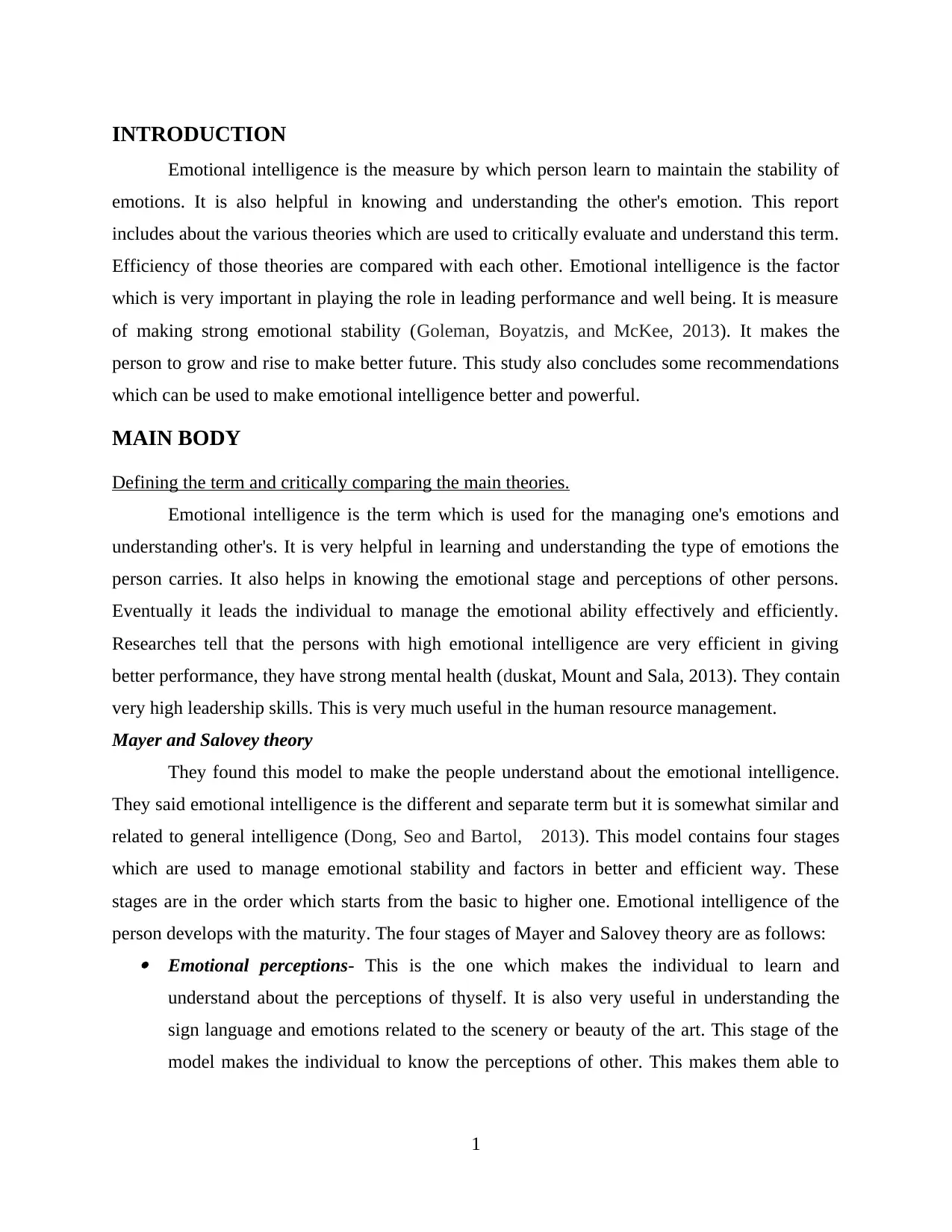
INTRODUCTION
Emotional intelligence is the measure by which person learn to maintain the stability of
emotions. It is also helpful in knowing and understanding the other's emotion. This report
includes about the various theories which are used to critically evaluate and understand this term.
Efficiency of those theories are compared with each other. Emotional intelligence is the factor
which is very important in playing the role in leading performance and well being. It is measure
of making strong emotional stability (Goleman, Boyatzis, and McKee, 2013). It makes the
person to grow and rise to make better future. This study also concludes some recommendations
which can be used to make emotional intelligence better and powerful.
MAIN BODY
Defining the term and critically comparing the main theories.
Emotional intelligence is the term which is used for the managing one's emotions and
understanding other's. It is very helpful in learning and understanding the type of emotions the
person carries. It also helps in knowing the emotional stage and perceptions of other persons.
Eventually it leads the individual to manage the emotional ability effectively and efficiently.
Researches tell that the persons with high emotional intelligence are very efficient in giving
better performance, they have strong mental health (duskat, Mount and Sala, 2013). They contain
very high leadership skills. This is very much useful in the human resource management.
Mayer and Salovey theory
They found this model to make the people understand about the emotional intelligence.
They said emotional intelligence is the different and separate term but it is somewhat similar and
related to general intelligence (Dong, Seo and Bartol, 2013). This model contains four stages
which are used to manage emotional stability and factors in better and efficient way. These
stages are in the order which starts from the basic to higher one. Emotional intelligence of the
person develops with the maturity. The four stages of Mayer and Salovey theory are as follows: Emotional perceptions- This is the one which makes the individual to learn and
understand about the perceptions of thyself. It is also very useful in understanding the
sign language and emotions related to the scenery or beauty of the art. This stage of the
model makes the individual to know the perceptions of other. This makes them able to
1
Emotional intelligence is the measure by which person learn to maintain the stability of
emotions. It is also helpful in knowing and understanding the other's emotion. This report
includes about the various theories which are used to critically evaluate and understand this term.
Efficiency of those theories are compared with each other. Emotional intelligence is the factor
which is very important in playing the role in leading performance and well being. It is measure
of making strong emotional stability (Goleman, Boyatzis, and McKee, 2013). It makes the
person to grow and rise to make better future. This study also concludes some recommendations
which can be used to make emotional intelligence better and powerful.
MAIN BODY
Defining the term and critically comparing the main theories.
Emotional intelligence is the term which is used for the managing one's emotions and
understanding other's. It is very helpful in learning and understanding the type of emotions the
person carries. It also helps in knowing the emotional stage and perceptions of other persons.
Eventually it leads the individual to manage the emotional ability effectively and efficiently.
Researches tell that the persons with high emotional intelligence are very efficient in giving
better performance, they have strong mental health (duskat, Mount and Sala, 2013). They contain
very high leadership skills. This is very much useful in the human resource management.
Mayer and Salovey theory
They found this model to make the people understand about the emotional intelligence.
They said emotional intelligence is the different and separate term but it is somewhat similar and
related to general intelligence (Dong, Seo and Bartol, 2013). This model contains four stages
which are used to manage emotional stability and factors in better and efficient way. These
stages are in the order which starts from the basic to higher one. Emotional intelligence of the
person develops with the maturity. The four stages of Mayer and Salovey theory are as follows: Emotional perceptions- This is the one which makes the individual to learn and
understand about the perceptions of thyself. It is also very useful in understanding the
sign language and emotions related to the scenery or beauty of the art. This stage of the
model makes the individual to know the perceptions of other. This makes them able to
1
Paraphrase This Document
Need a fresh take? Get an instant paraphrase of this document with our AI Paraphraser
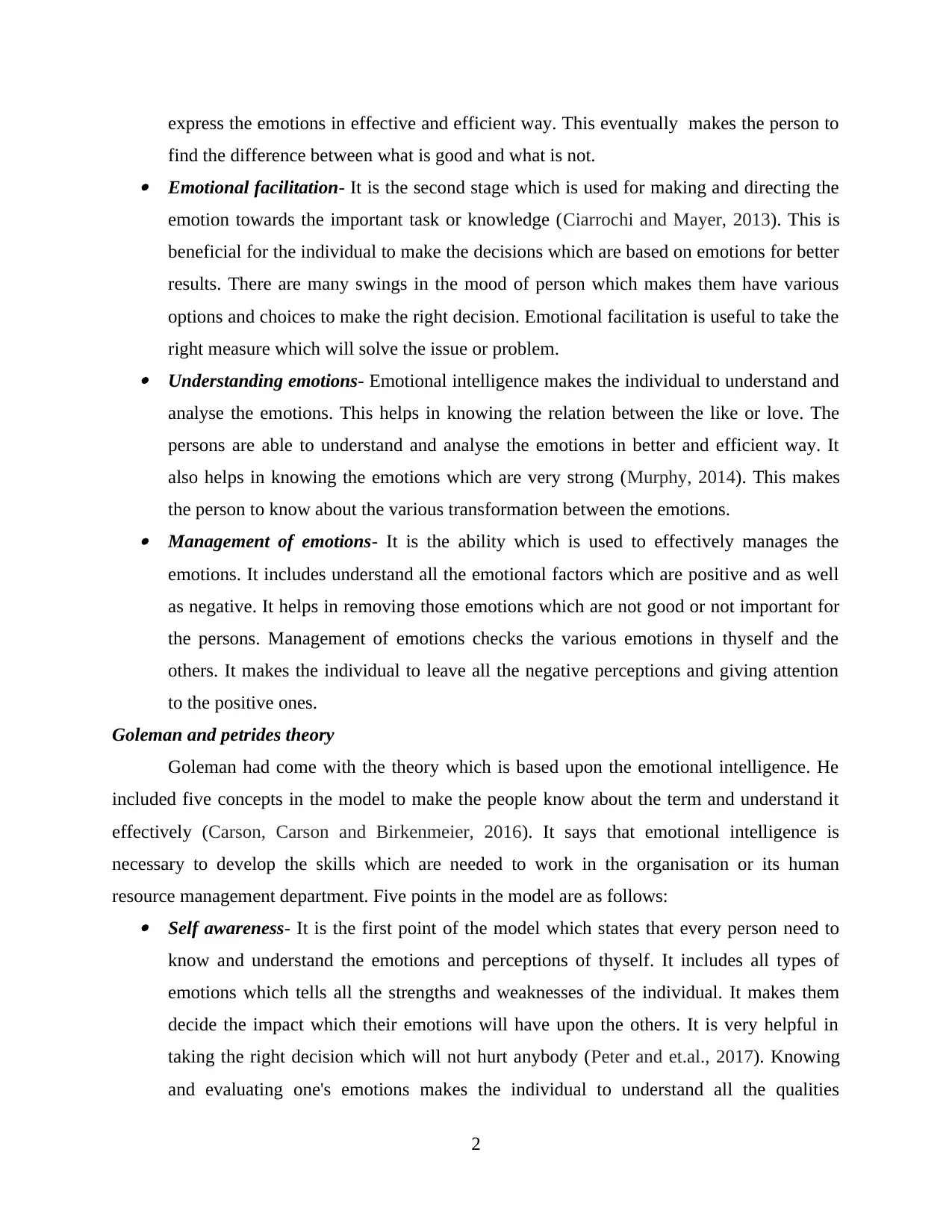
express the emotions in effective and efficient way. This eventually makes the person to
find the difference between what is good and what is not. Emotional facilitation- It is the second stage which is used for making and directing the
emotion towards the important task or knowledge (Ciarrochi and Mayer, 2013). This is
beneficial for the individual to make the decisions which are based on emotions for better
results. There are many swings in the mood of person which makes them have various
options and choices to make the right decision. Emotional facilitation is useful to take the
right measure which will solve the issue or problem. Understanding emotions- Emotional intelligence makes the individual to understand and
analyse the emotions. This helps in knowing the relation between the like or love. The
persons are able to understand and analyse the emotions in better and efficient way. It
also helps in knowing the emotions which are very strong (Murphy, 2014). This makes
the person to know about the various transformation between the emotions. Management of emotions- It is the ability which is used to effectively manages the
emotions. It includes understand all the emotional factors which are positive and as well
as negative. It helps in removing those emotions which are not good or not important for
the persons. Management of emotions checks the various emotions in thyself and the
others. It makes the individual to leave all the negative perceptions and giving attention
to the positive ones.
Goleman and petrides theory
Goleman had come with the theory which is based upon the emotional intelligence. He
included five concepts in the model to make the people know about the term and understand it
effectively (Carson, Carson and Birkenmeier, 2016). It says that emotional intelligence is
necessary to develop the skills which are needed to work in the organisation or its human
resource management department. Five points in the model are as follows: Self awareness- It is the first point of the model which states that every person need to
know and understand the emotions and perceptions of thyself. It includes all types of
emotions which tells all the strengths and weaknesses of the individual. It makes them
decide the impact which their emotions will have upon the others. It is very helpful in
taking the right decision which will not hurt anybody (Peter and et.al., 2017). Knowing
and evaluating one's emotions makes the individual to understand all the qualities
2
find the difference between what is good and what is not. Emotional facilitation- It is the second stage which is used for making and directing the
emotion towards the important task or knowledge (Ciarrochi and Mayer, 2013). This is
beneficial for the individual to make the decisions which are based on emotions for better
results. There are many swings in the mood of person which makes them have various
options and choices to make the right decision. Emotional facilitation is useful to take the
right measure which will solve the issue or problem. Understanding emotions- Emotional intelligence makes the individual to understand and
analyse the emotions. This helps in knowing the relation between the like or love. The
persons are able to understand and analyse the emotions in better and efficient way. It
also helps in knowing the emotions which are very strong (Murphy, 2014). This makes
the person to know about the various transformation between the emotions. Management of emotions- It is the ability which is used to effectively manages the
emotions. It includes understand all the emotional factors which are positive and as well
as negative. It helps in removing those emotions which are not good or not important for
the persons. Management of emotions checks the various emotions in thyself and the
others. It makes the individual to leave all the negative perceptions and giving attention
to the positive ones.
Goleman and petrides theory
Goleman had come with the theory which is based upon the emotional intelligence. He
included five concepts in the model to make the people know about the term and understand it
effectively (Carson, Carson and Birkenmeier, 2016). It says that emotional intelligence is
necessary to develop the skills which are needed to work in the organisation or its human
resource management department. Five points in the model are as follows: Self awareness- It is the first point of the model which states that every person need to
know and understand the emotions and perceptions of thyself. It includes all types of
emotions which tells all the strengths and weaknesses of the individual. It makes them
decide the impact which their emotions will have upon the others. It is very helpful in
taking the right decision which will not hurt anybody (Peter and et.al., 2017). Knowing
and evaluating one's emotions makes the individual to understand all the qualities
2
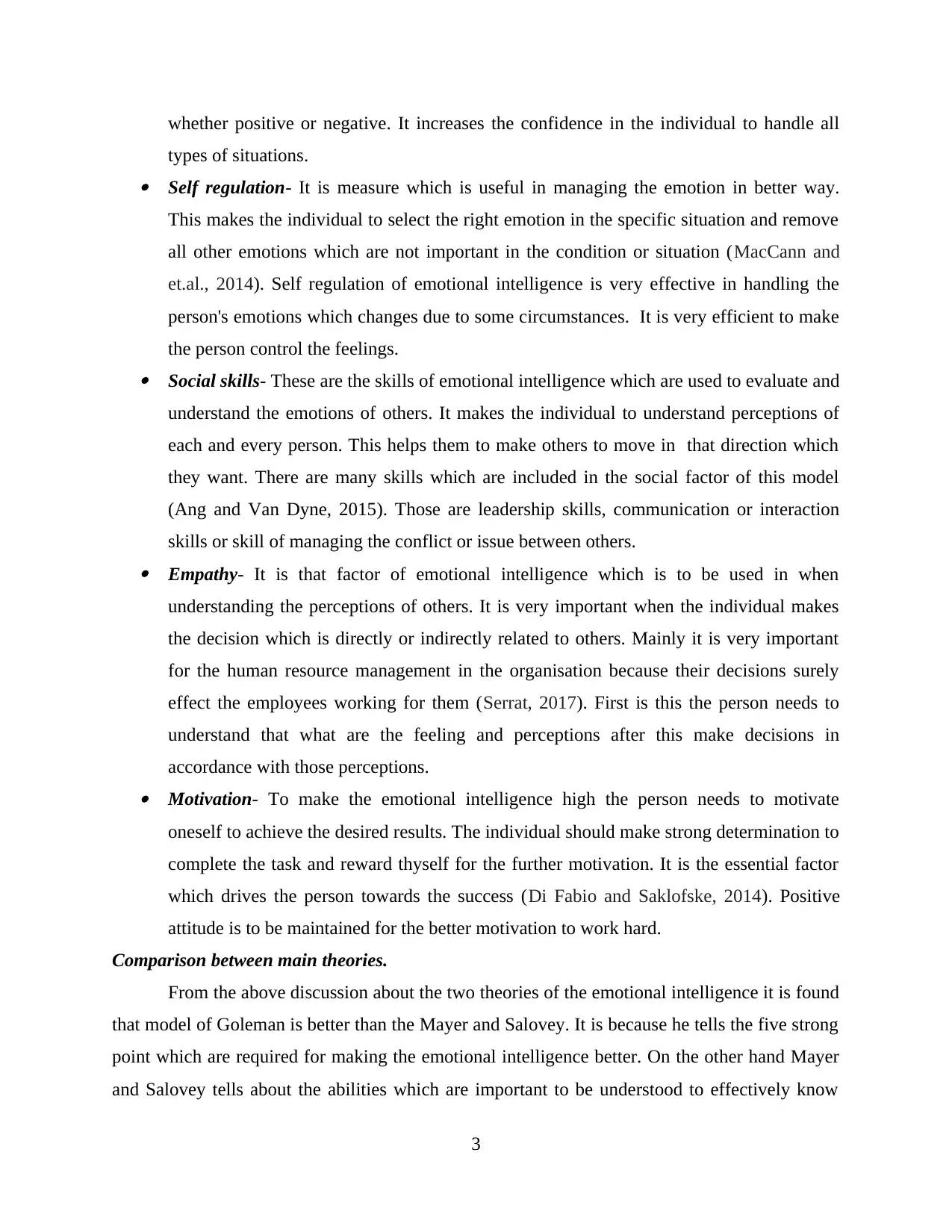
whether positive or negative. It increases the confidence in the individual to handle all
types of situations. Self regulation- It is measure which is useful in managing the emotion in better way.
This makes the individual to select the right emotion in the specific situation and remove
all other emotions which are not important in the condition or situation (MacCann and
et.al., 2014). Self regulation of emotional intelligence is very effective in handling the
person's emotions which changes due to some circumstances. It is very efficient to make
the person control the feelings. Social skills- These are the skills of emotional intelligence which are used to evaluate and
understand the emotions of others. It makes the individual to understand perceptions of
each and every person. This helps them to make others to move in that direction which
they want. There are many skills which are included in the social factor of this model
(Ang and Van Dyne, 2015). Those are leadership skills, communication or interaction
skills or skill of managing the conflict or issue between others. Empathy- It is that factor of emotional intelligence which is to be used in when
understanding the perceptions of others. It is very important when the individual makes
the decision which is directly or indirectly related to others. Mainly it is very important
for the human resource management in the organisation because their decisions surely
effect the employees working for them (Serrat, 2017). First is this the person needs to
understand that what are the feeling and perceptions after this make decisions in
accordance with those perceptions. Motivation- To make the emotional intelligence high the person needs to motivate
oneself to achieve the desired results. The individual should make strong determination to
complete the task and reward thyself for the further motivation. It is the essential factor
which drives the person towards the success (Di Fabio and Saklofske, 2014). Positive
attitude is to be maintained for the better motivation to work hard.
Comparison between main theories.
From the above discussion about the two theories of the emotional intelligence it is found
that model of Goleman is better than the Mayer and Salovey. It is because he tells the five strong
point which are required for making the emotional intelligence better. On the other hand Mayer
and Salovey tells about the abilities which are important to be understood to effectively know
3
types of situations. Self regulation- It is measure which is useful in managing the emotion in better way.
This makes the individual to select the right emotion in the specific situation and remove
all other emotions which are not important in the condition or situation (MacCann and
et.al., 2014). Self regulation of emotional intelligence is very effective in handling the
person's emotions which changes due to some circumstances. It is very efficient to make
the person control the feelings. Social skills- These are the skills of emotional intelligence which are used to evaluate and
understand the emotions of others. It makes the individual to understand perceptions of
each and every person. This helps them to make others to move in that direction which
they want. There are many skills which are included in the social factor of this model
(Ang and Van Dyne, 2015). Those are leadership skills, communication or interaction
skills or skill of managing the conflict or issue between others. Empathy- It is that factor of emotional intelligence which is to be used in when
understanding the perceptions of others. It is very important when the individual makes
the decision which is directly or indirectly related to others. Mainly it is very important
for the human resource management in the organisation because their decisions surely
effect the employees working for them (Serrat, 2017). First is this the person needs to
understand that what are the feeling and perceptions after this make decisions in
accordance with those perceptions. Motivation- To make the emotional intelligence high the person needs to motivate
oneself to achieve the desired results. The individual should make strong determination to
complete the task and reward thyself for the further motivation. It is the essential factor
which drives the person towards the success (Di Fabio and Saklofske, 2014). Positive
attitude is to be maintained for the better motivation to work hard.
Comparison between main theories.
From the above discussion about the two theories of the emotional intelligence it is found
that model of Goleman is better than the Mayer and Salovey. It is because he tells the five strong
point which are required for making the emotional intelligence better. On the other hand Mayer
and Salovey tells about the abilities which are important to be understood to effectively know
3
⊘ This is a preview!⊘
Do you want full access?
Subscribe today to unlock all pages.

Trusted by 1+ million students worldwide
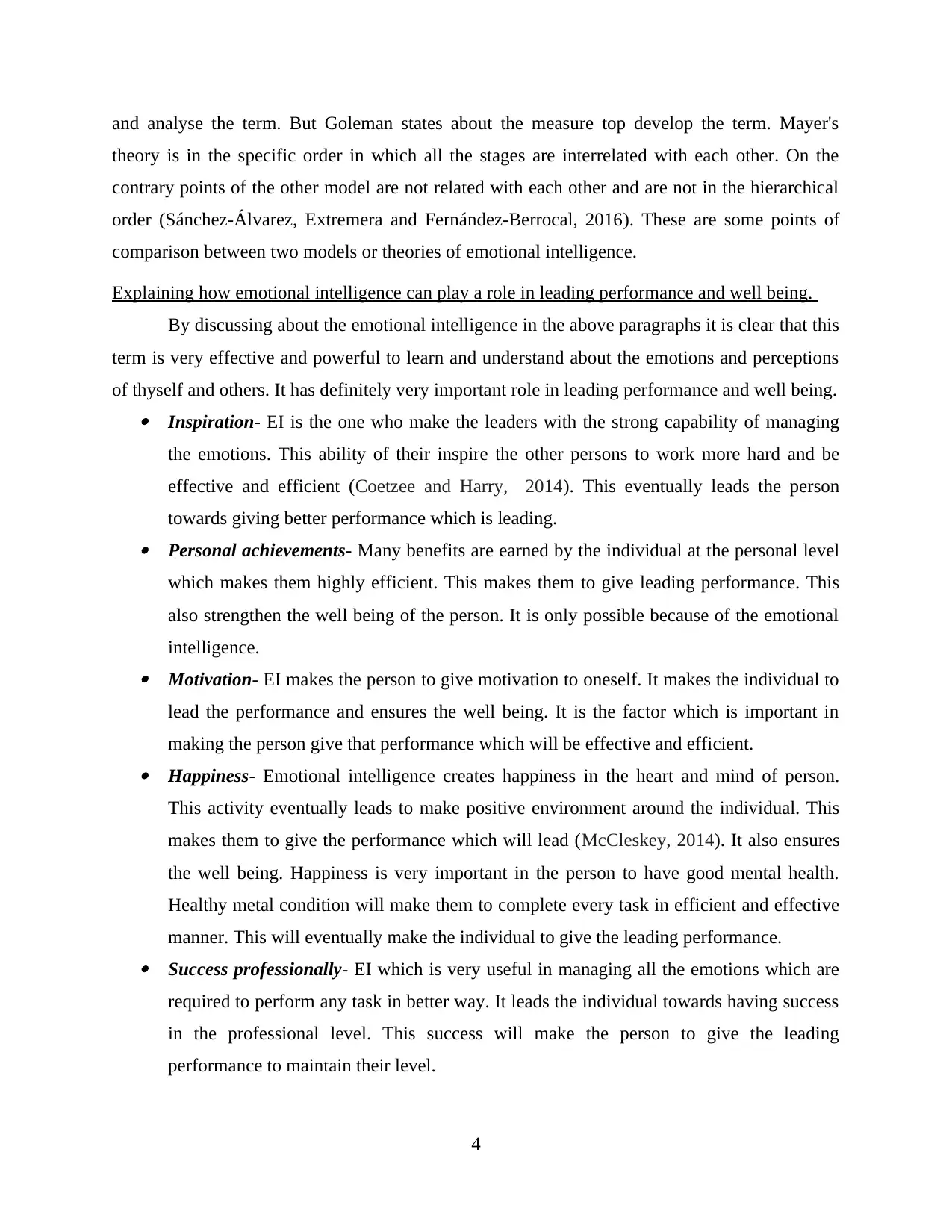
and analyse the term. But Goleman states about the measure top develop the term. Mayer's
theory is in the specific order in which all the stages are interrelated with each other. On the
contrary points of the other model are not related with each other and are not in the hierarchical
order (Sánchez-Álvarez, Extremera and Fernández-Berrocal, 2016). These are some points of
comparison between two models or theories of emotional intelligence.
Explaining how emotional intelligence can play a role in leading performance and well being.
By discussing about the emotional intelligence in the above paragraphs it is clear that this
term is very effective and powerful to learn and understand about the emotions and perceptions
of thyself and others. It has definitely very important role in leading performance and well being. Inspiration- EI is the one who make the leaders with the strong capability of managing
the emotions. This ability of their inspire the other persons to work more hard and be
effective and efficient (Coetzee and Harry, 2014). This eventually leads the person
towards giving better performance which is leading. Personal achievements- Many benefits are earned by the individual at the personal level
which makes them highly efficient. This makes them to give leading performance. This
also strengthen the well being of the person. It is only possible because of the emotional
intelligence. Motivation- EI makes the person to give motivation to oneself. It makes the individual to
lead the performance and ensures the well being. It is the factor which is important in
making the person give that performance which will be effective and efficient. Happiness- Emotional intelligence creates happiness in the heart and mind of person.
This activity eventually leads to make positive environment around the individual. This
makes them to give the performance which will lead (McCleskey, 2014). It also ensures
the well being. Happiness is very important in the person to have good mental health.
Healthy metal condition will make them to complete every task in efficient and effective
manner. This will eventually make the individual to give the leading performance. Success professionally- EI which is very useful in managing all the emotions which are
required to perform any task in better way. It leads the individual towards having success
in the professional level. This success will make the person to give the leading
performance to maintain their level.
4
theory is in the specific order in which all the stages are interrelated with each other. On the
contrary points of the other model are not related with each other and are not in the hierarchical
order (Sánchez-Álvarez, Extremera and Fernández-Berrocal, 2016). These are some points of
comparison between two models or theories of emotional intelligence.
Explaining how emotional intelligence can play a role in leading performance and well being.
By discussing about the emotional intelligence in the above paragraphs it is clear that this
term is very effective and powerful to learn and understand about the emotions and perceptions
of thyself and others. It has definitely very important role in leading performance and well being. Inspiration- EI is the one who make the leaders with the strong capability of managing
the emotions. This ability of their inspire the other persons to work more hard and be
effective and efficient (Coetzee and Harry, 2014). This eventually leads the person
towards giving better performance which is leading. Personal achievements- Many benefits are earned by the individual at the personal level
which makes them highly efficient. This makes them to give leading performance. This
also strengthen the well being of the person. It is only possible because of the emotional
intelligence. Motivation- EI makes the person to give motivation to oneself. It makes the individual to
lead the performance and ensures the well being. It is the factor which is important in
making the person give that performance which will be effective and efficient. Happiness- Emotional intelligence creates happiness in the heart and mind of person.
This activity eventually leads to make positive environment around the individual. This
makes them to give the performance which will lead (McCleskey, 2014). It also ensures
the well being. Happiness is very important in the person to have good mental health.
Healthy metal condition will make them to complete every task in efficient and effective
manner. This will eventually make the individual to give the leading performance. Success professionally- EI which is very useful in managing all the emotions which are
required to perform any task in better way. It leads the individual towards having success
in the professional level. This success will make the person to give the leading
performance to maintain their level.
4
Paraphrase This Document
Need a fresh take? Get an instant paraphrase of this document with our AI Paraphraser
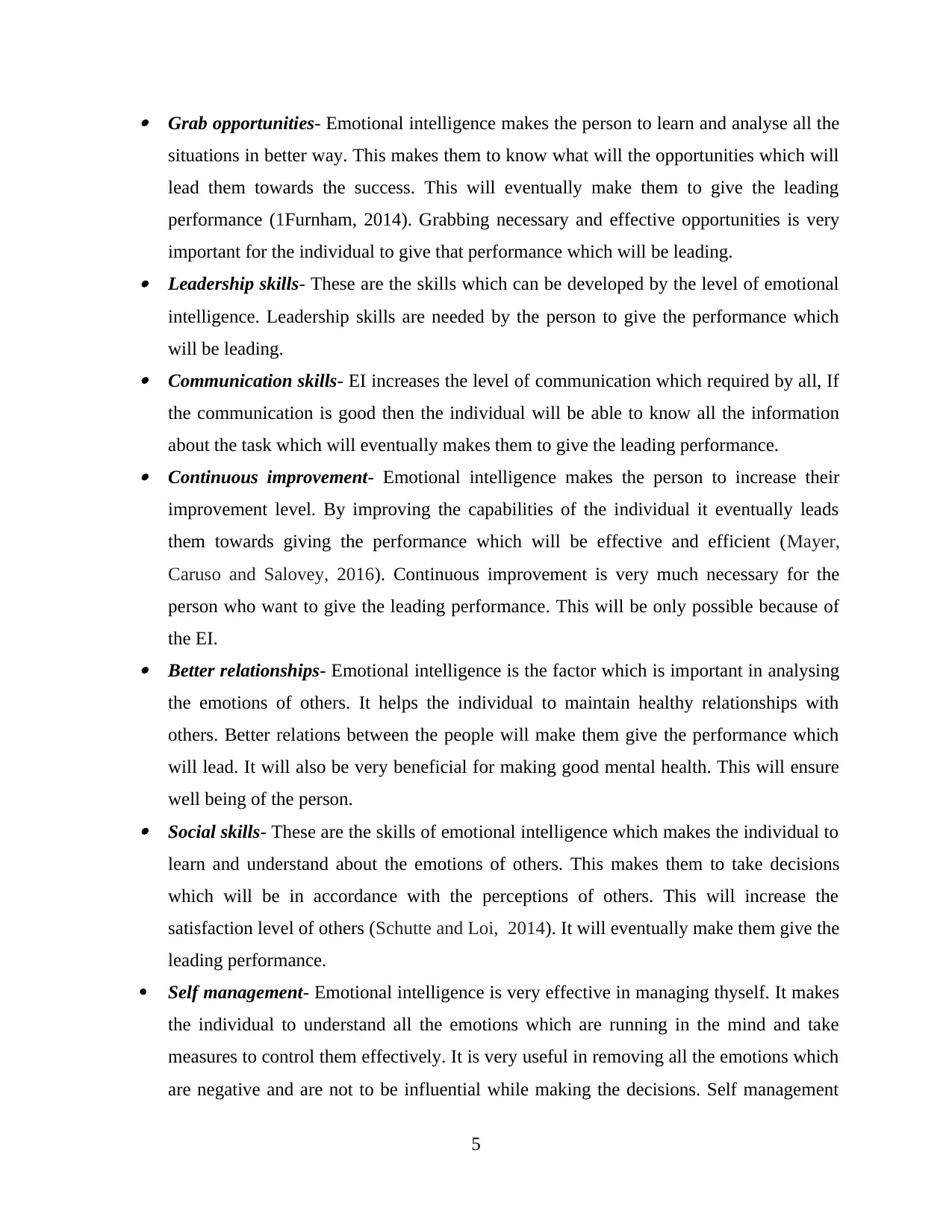
Grab opportunities- Emotional intelligence makes the person to learn and analyse all the
situations in better way. This makes them to know what will the opportunities which will
lead them towards the success. This will eventually make them to give the leading
performance (1Furnham, 2014). Grabbing necessary and effective opportunities is very
important for the individual to give that performance which will be leading. Leadership skills- These are the skills which can be developed by the level of emotional
intelligence. Leadership skills are needed by the person to give the performance which
will be leading. Communication skills- EI increases the level of communication which required by all, If
the communication is good then the individual will be able to know all the information
about the task which will eventually makes them to give the leading performance. Continuous improvement- Emotional intelligence makes the person to increase their
improvement level. By improving the capabilities of the individual it eventually leads
them towards giving the performance which will be effective and efficient (Mayer,
Caruso and Salovey, 2016). Continuous improvement is very much necessary for the
person who want to give the leading performance. This will be only possible because of
the EI. Better relationships- Emotional intelligence is the factor which is important in analysing
the emotions of others. It helps the individual to maintain healthy relationships with
others. Better relations between the people will make them give the performance which
will lead. It will also be very beneficial for making good mental health. This will ensure
well being of the person. Social skills- These are the skills of emotional intelligence which makes the individual to
learn and understand about the emotions of others. This makes them to take decisions
which will be in accordance with the perceptions of others. This will increase the
satisfaction level of others (Schutte and Loi, 2014). It will eventually make them give the
leading performance.
Self management- Emotional intelligence is very effective in managing thyself. It makes
the individual to understand all the emotions which are running in the mind and take
measures to control them effectively. It is very useful in removing all the emotions which
are negative and are not to be influential while making the decisions. Self management
5
situations in better way. This makes them to know what will the opportunities which will
lead them towards the success. This will eventually make them to give the leading
performance (1Furnham, 2014). Grabbing necessary and effective opportunities is very
important for the individual to give that performance which will be leading. Leadership skills- These are the skills which can be developed by the level of emotional
intelligence. Leadership skills are needed by the person to give the performance which
will be leading. Communication skills- EI increases the level of communication which required by all, If
the communication is good then the individual will be able to know all the information
about the task which will eventually makes them to give the leading performance. Continuous improvement- Emotional intelligence makes the person to increase their
improvement level. By improving the capabilities of the individual it eventually leads
them towards giving the performance which will be effective and efficient (Mayer,
Caruso and Salovey, 2016). Continuous improvement is very much necessary for the
person who want to give the leading performance. This will be only possible because of
the EI. Better relationships- Emotional intelligence is the factor which is important in analysing
the emotions of others. It helps the individual to maintain healthy relationships with
others. Better relations between the people will make them give the performance which
will lead. It will also be very beneficial for making good mental health. This will ensure
well being of the person. Social skills- These are the skills of emotional intelligence which makes the individual to
learn and understand about the emotions of others. This makes them to take decisions
which will be in accordance with the perceptions of others. This will increase the
satisfaction level of others (Schutte and Loi, 2014). It will eventually make them give the
leading performance.
Self management- Emotional intelligence is very effective in managing thyself. It makes
the individual to understand all the emotions which are running in the mind and take
measures to control them effectively. It is very useful in removing all the emotions which
are negative and are not to be influential while making the decisions. Self management
5
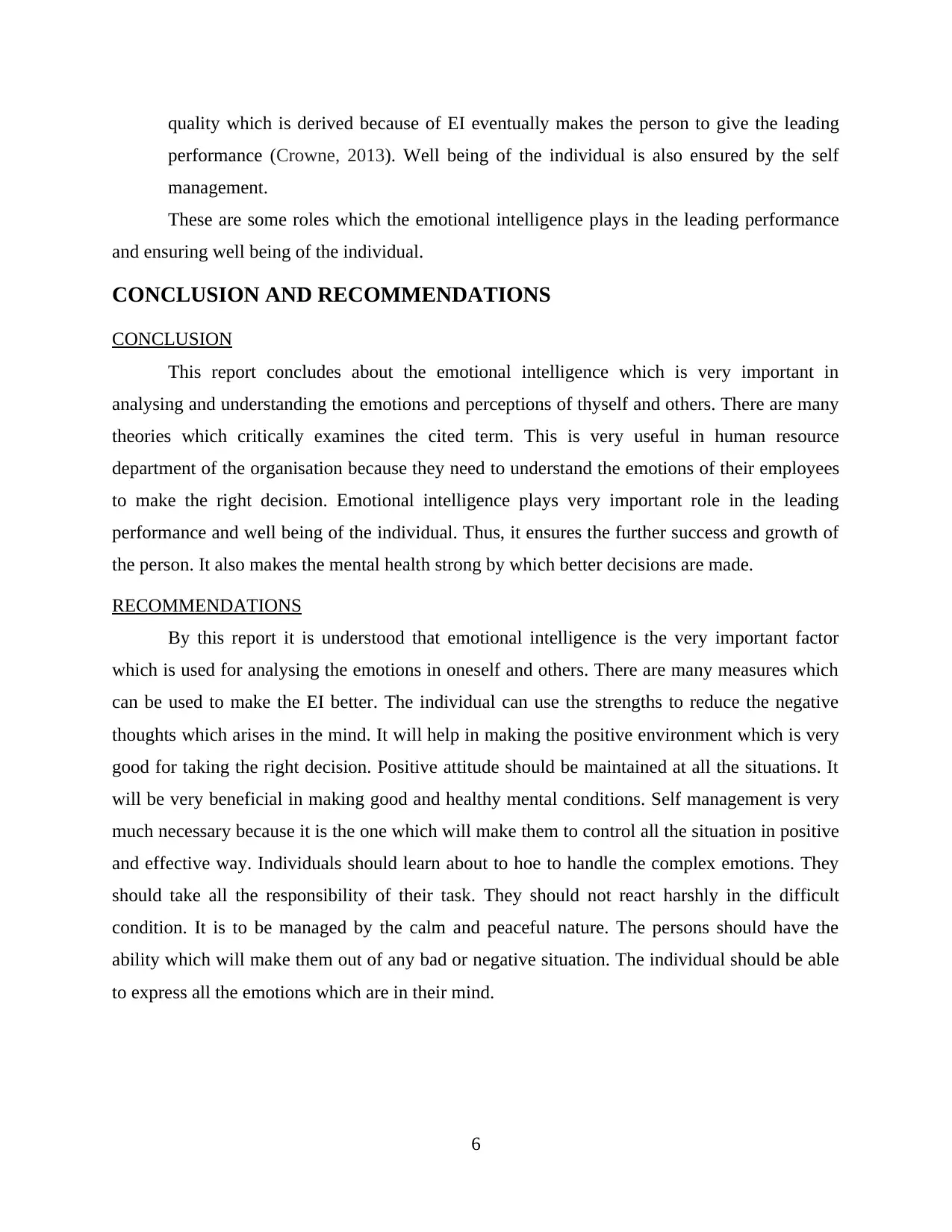
quality which is derived because of EI eventually makes the person to give the leading
performance (Crowne, 2013). Well being of the individual is also ensured by the self
management.
These are some roles which the emotional intelligence plays in the leading performance
and ensuring well being of the individual.
CONCLUSION AND RECOMMENDATIONS
CONCLUSION
This report concludes about the emotional intelligence which is very important in
analysing and understanding the emotions and perceptions of thyself and others. There are many
theories which critically examines the cited term. This is very useful in human resource
department of the organisation because they need to understand the emotions of their employees
to make the right decision. Emotional intelligence plays very important role in the leading
performance and well being of the individual. Thus, it ensures the further success and growth of
the person. It also makes the mental health strong by which better decisions are made.
RECOMMENDATIONS
By this report it is understood that emotional intelligence is the very important factor
which is used for analysing the emotions in oneself and others. There are many measures which
can be used to make the EI better. The individual can use the strengths to reduce the negative
thoughts which arises in the mind. It will help in making the positive environment which is very
good for taking the right decision. Positive attitude should be maintained at all the situations. It
will be very beneficial in making good and healthy mental conditions. Self management is very
much necessary because it is the one which will make them to control all the situation in positive
and effective way. Individuals should learn about to hoe to handle the complex emotions. They
should take all the responsibility of their task. They should not react harshly in the difficult
condition. It is to be managed by the calm and peaceful nature. The persons should have the
ability which will make them out of any bad or negative situation. The individual should be able
to express all the emotions which are in their mind.
6
performance (Crowne, 2013). Well being of the individual is also ensured by the self
management.
These are some roles which the emotional intelligence plays in the leading performance
and ensuring well being of the individual.
CONCLUSION AND RECOMMENDATIONS
CONCLUSION
This report concludes about the emotional intelligence which is very important in
analysing and understanding the emotions and perceptions of thyself and others. There are many
theories which critically examines the cited term. This is very useful in human resource
department of the organisation because they need to understand the emotions of their employees
to make the right decision. Emotional intelligence plays very important role in the leading
performance and well being of the individual. Thus, it ensures the further success and growth of
the person. It also makes the mental health strong by which better decisions are made.
RECOMMENDATIONS
By this report it is understood that emotional intelligence is the very important factor
which is used for analysing the emotions in oneself and others. There are many measures which
can be used to make the EI better. The individual can use the strengths to reduce the negative
thoughts which arises in the mind. It will help in making the positive environment which is very
good for taking the right decision. Positive attitude should be maintained at all the situations. It
will be very beneficial in making good and healthy mental conditions. Self management is very
much necessary because it is the one which will make them to control all the situation in positive
and effective way. Individuals should learn about to hoe to handle the complex emotions. They
should take all the responsibility of their task. They should not react harshly in the difficult
condition. It is to be managed by the calm and peaceful nature. The persons should have the
ability which will make them out of any bad or negative situation. The individual should be able
to express all the emotions which are in their mind.
6
⊘ This is a preview!⊘
Do you want full access?
Subscribe today to unlock all pages.

Trusted by 1+ million students worldwide
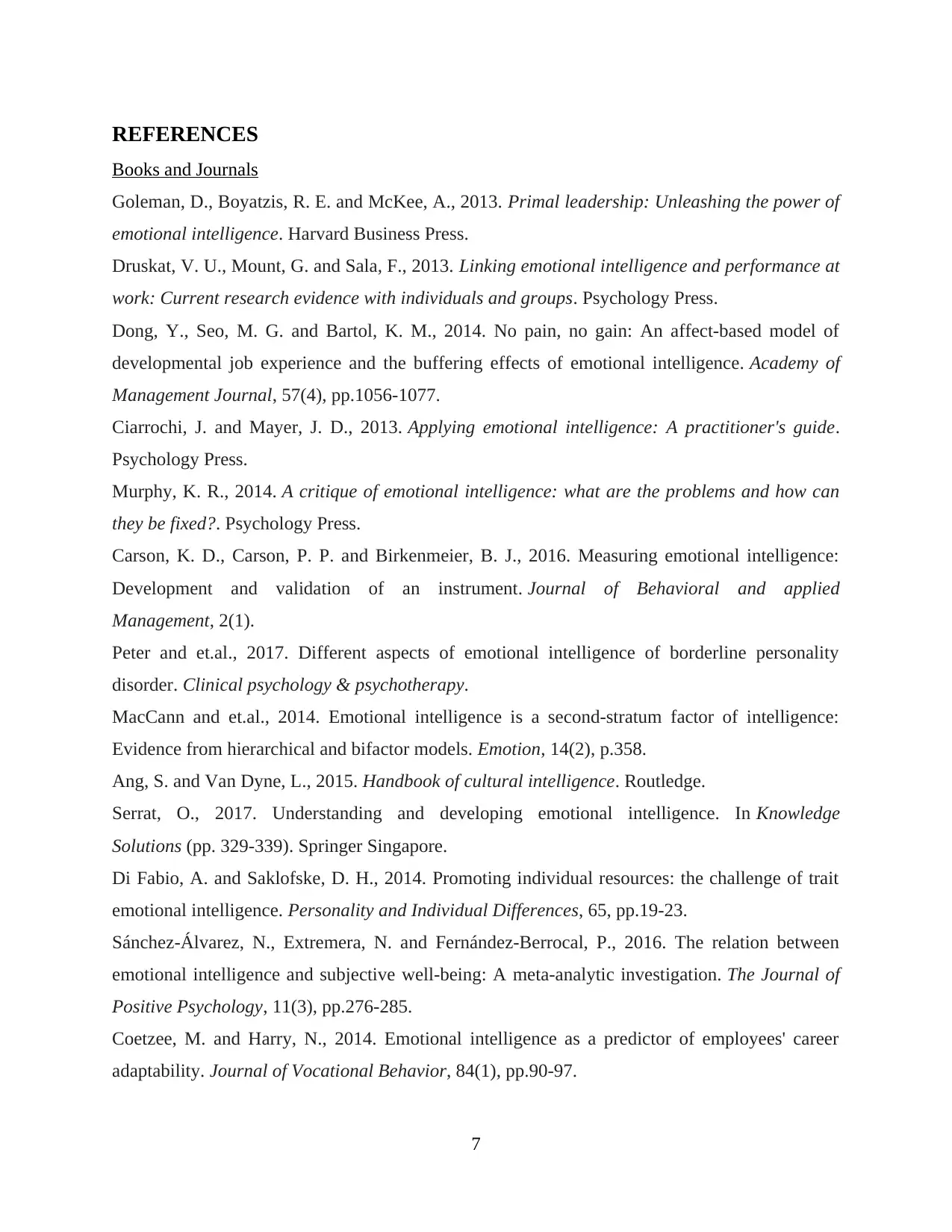
REFERENCES
Books and Journals
Goleman, D., Boyatzis, R. E. and McKee, A., 2013. Primal leadership: Unleashing the power of
emotional intelligence. Harvard Business Press.
Druskat, V. U., Mount, G. and Sala, F., 2013. Linking emotional intelligence and performance at
work: Current research evidence with individuals and groups. Psychology Press.
Dong, Y., Seo, M. G. and Bartol, K. M., 2014. No pain, no gain: An affect-based model of
developmental job experience and the buffering effects of emotional intelligence. Academy of
Management Journal, 57(4), pp.1056-1077.
Ciarrochi, J. and Mayer, J. D., 2013. Applying emotional intelligence: A practitioner's guide.
Psychology Press.
Murphy, K. R., 2014. A critique of emotional intelligence: what are the problems and how can
they be fixed?. Psychology Press.
Carson, K. D., Carson, P. P. and Birkenmeier, B. J., 2016. Measuring emotional intelligence:
Development and validation of an instrument. Journal of Behavioral and applied
Management, 2(1).
Peter and et.al., 2017. Different aspects of emotional intelligence of borderline personality
disorder. Clinical psychology & psychotherapy.
MacCann and et.al., 2014. Emotional intelligence is a second-stratum factor of intelligence:
Evidence from hierarchical and bifactor models. Emotion, 14(2), p.358.
Ang, S. and Van Dyne, L., 2015. Handbook of cultural intelligence. Routledge.
Serrat, O., 2017. Understanding and developing emotional intelligence. In Knowledge
Solutions (pp. 329-339). Springer Singapore.
Di Fabio, A. and Saklofske, D. H., 2014. Promoting individual resources: the challenge of trait
emotional intelligence. Personality and Individual Differences, 65, pp.19-23.
Sánchez-Álvarez, N., Extremera, N. and Fernández-Berrocal, P., 2016. The relation between
emotional intelligence and subjective well-being: A meta-analytic investigation. The Journal of
Positive Psychology, 11(3), pp.276-285.
Coetzee, M. and Harry, N., 2014. Emotional intelligence as a predictor of employees' career
adaptability. Journal of Vocational Behavior, 84(1), pp.90-97.
7
Books and Journals
Goleman, D., Boyatzis, R. E. and McKee, A., 2013. Primal leadership: Unleashing the power of
emotional intelligence. Harvard Business Press.
Druskat, V. U., Mount, G. and Sala, F., 2013. Linking emotional intelligence and performance at
work: Current research evidence with individuals and groups. Psychology Press.
Dong, Y., Seo, M. G. and Bartol, K. M., 2014. No pain, no gain: An affect-based model of
developmental job experience and the buffering effects of emotional intelligence. Academy of
Management Journal, 57(4), pp.1056-1077.
Ciarrochi, J. and Mayer, J. D., 2013. Applying emotional intelligence: A practitioner's guide.
Psychology Press.
Murphy, K. R., 2014. A critique of emotional intelligence: what are the problems and how can
they be fixed?. Psychology Press.
Carson, K. D., Carson, P. P. and Birkenmeier, B. J., 2016. Measuring emotional intelligence:
Development and validation of an instrument. Journal of Behavioral and applied
Management, 2(1).
Peter and et.al., 2017. Different aspects of emotional intelligence of borderline personality
disorder. Clinical psychology & psychotherapy.
MacCann and et.al., 2014. Emotional intelligence is a second-stratum factor of intelligence:
Evidence from hierarchical and bifactor models. Emotion, 14(2), p.358.
Ang, S. and Van Dyne, L., 2015. Handbook of cultural intelligence. Routledge.
Serrat, O., 2017. Understanding and developing emotional intelligence. In Knowledge
Solutions (pp. 329-339). Springer Singapore.
Di Fabio, A. and Saklofske, D. H., 2014. Promoting individual resources: the challenge of trait
emotional intelligence. Personality and Individual Differences, 65, pp.19-23.
Sánchez-Álvarez, N., Extremera, N. and Fernández-Berrocal, P., 2016. The relation between
emotional intelligence and subjective well-being: A meta-analytic investigation. The Journal of
Positive Psychology, 11(3), pp.276-285.
Coetzee, M. and Harry, N., 2014. Emotional intelligence as a predictor of employees' career
adaptability. Journal of Vocational Behavior, 84(1), pp.90-97.
7
Paraphrase This Document
Need a fresh take? Get an instant paraphrase of this document with our AI Paraphraser
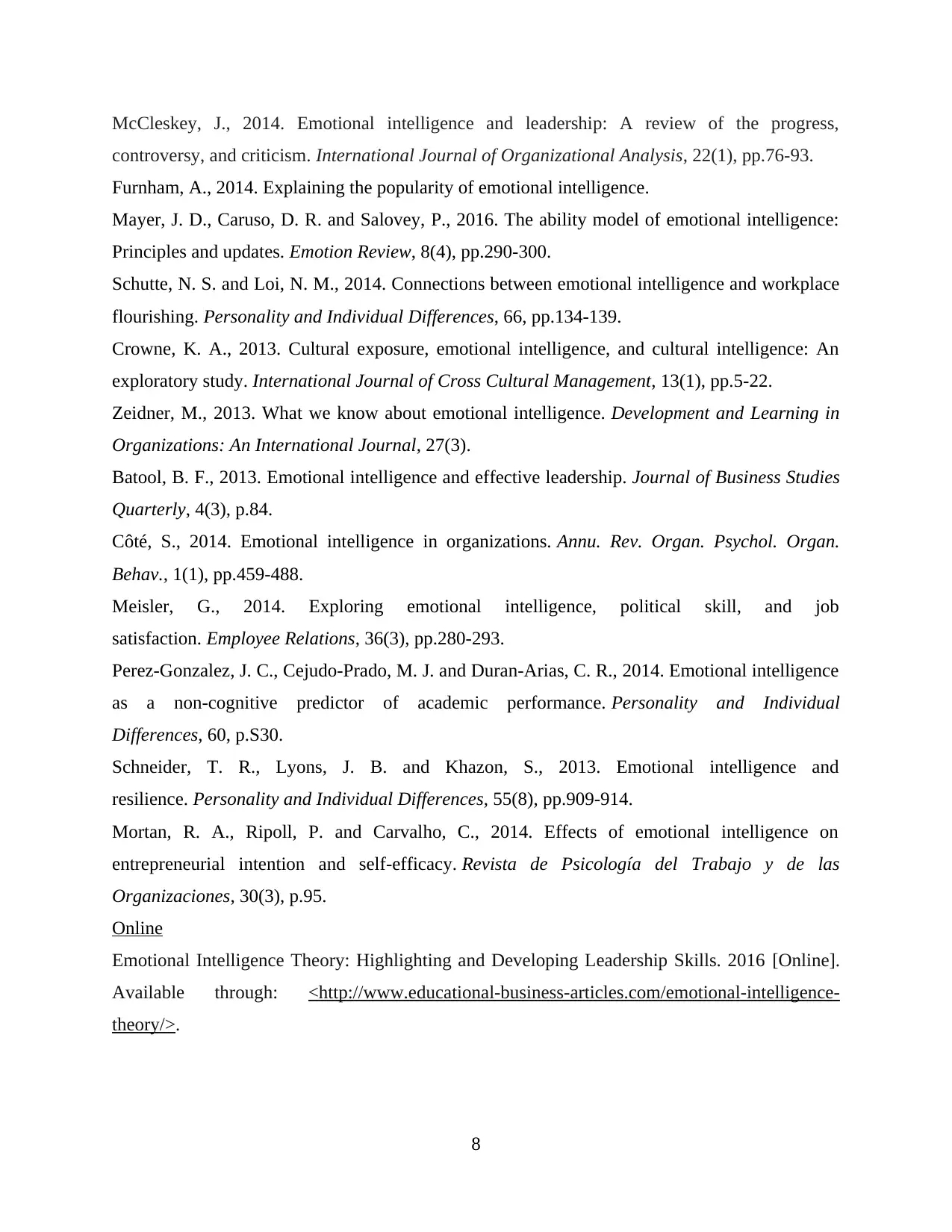
McCleskey, J., 2014. Emotional intelligence and leadership: A review of the progress,
controversy, and criticism. International Journal of Organizational Analysis, 22(1), pp.76-93.
Furnham, A., 2014. Explaining the popularity of emotional intelligence.
Mayer, J. D., Caruso, D. R. and Salovey, P., 2016. The ability model of emotional intelligence:
Principles and updates. Emotion Review, 8(4), pp.290-300.
Schutte, N. S. and Loi, N. M., 2014. Connections between emotional intelligence and workplace
flourishing. Personality and Individual Differences, 66, pp.134-139.
Crowne, K. A., 2013. Cultural exposure, emotional intelligence, and cultural intelligence: An
exploratory study. International Journal of Cross Cultural Management, 13(1), pp.5-22.
Zeidner, M., 2013. What we know about emotional intelligence. Development and Learning in
Organizations: An International Journal, 27(3).
Batool, B. F., 2013. Emotional intelligence and effective leadership. Journal of Business Studies
Quarterly, 4(3), p.84.
Côté, S., 2014. Emotional intelligence in organizations. Annu. Rev. Organ. Psychol. Organ.
Behav., 1(1), pp.459-488.
Meisler, G., 2014. Exploring emotional intelligence, political skill, and job
satisfaction. Employee Relations, 36(3), pp.280-293.
Perez-Gonzalez, J. C., Cejudo-Prado, M. J. and Duran-Arias, C. R., 2014. Emotional intelligence
as a non-cognitive predictor of academic performance. Personality and Individual
Differences, 60, p.S30.
Schneider, T. R., Lyons, J. B. and Khazon, S., 2013. Emotional intelligence and
resilience. Personality and Individual Differences, 55(8), pp.909-914.
Mortan, R. A., Ripoll, P. and Carvalho, C., 2014. Effects of emotional intelligence on
entrepreneurial intention and self-efficacy. Revista de Psicología del Trabajo y de las
Organizaciones, 30(3), p.95.
Online
Emotional Intelligence Theory: Highlighting and Developing Leadership Skills. 2016 [Online].
Available through: <http://www.educational-business-articles.com/emotional-intelligence-
theory/>.
8
controversy, and criticism. International Journal of Organizational Analysis, 22(1), pp.76-93.
Furnham, A., 2014. Explaining the popularity of emotional intelligence.
Mayer, J. D., Caruso, D. R. and Salovey, P., 2016. The ability model of emotional intelligence:
Principles and updates. Emotion Review, 8(4), pp.290-300.
Schutte, N. S. and Loi, N. M., 2014. Connections between emotional intelligence and workplace
flourishing. Personality and Individual Differences, 66, pp.134-139.
Crowne, K. A., 2013. Cultural exposure, emotional intelligence, and cultural intelligence: An
exploratory study. International Journal of Cross Cultural Management, 13(1), pp.5-22.
Zeidner, M., 2013. What we know about emotional intelligence. Development and Learning in
Organizations: An International Journal, 27(3).
Batool, B. F., 2013. Emotional intelligence and effective leadership. Journal of Business Studies
Quarterly, 4(3), p.84.
Côté, S., 2014. Emotional intelligence in organizations. Annu. Rev. Organ. Psychol. Organ.
Behav., 1(1), pp.459-488.
Meisler, G., 2014. Exploring emotional intelligence, political skill, and job
satisfaction. Employee Relations, 36(3), pp.280-293.
Perez-Gonzalez, J. C., Cejudo-Prado, M. J. and Duran-Arias, C. R., 2014. Emotional intelligence
as a non-cognitive predictor of academic performance. Personality and Individual
Differences, 60, p.S30.
Schneider, T. R., Lyons, J. B. and Khazon, S., 2013. Emotional intelligence and
resilience. Personality and Individual Differences, 55(8), pp.909-914.
Mortan, R. A., Ripoll, P. and Carvalho, C., 2014. Effects of emotional intelligence on
entrepreneurial intention and self-efficacy. Revista de Psicología del Trabajo y de las
Organizaciones, 30(3), p.95.
Online
Emotional Intelligence Theory: Highlighting and Developing Leadership Skills. 2016 [Online].
Available through: <http://www.educational-business-articles.com/emotional-intelligence-
theory/>.
8

9
⊘ This is a preview!⊘
Do you want full access?
Subscribe today to unlock all pages.

Trusted by 1+ million students worldwide
1 out of 13
Related Documents
Your All-in-One AI-Powered Toolkit for Academic Success.
+13062052269
info@desklib.com
Available 24*7 on WhatsApp / Email
![[object Object]](/_next/static/media/star-bottom.7253800d.svg)
Unlock your academic potential
Copyright © 2020–2026 A2Z Services. All Rights Reserved. Developed and managed by ZUCOL.




